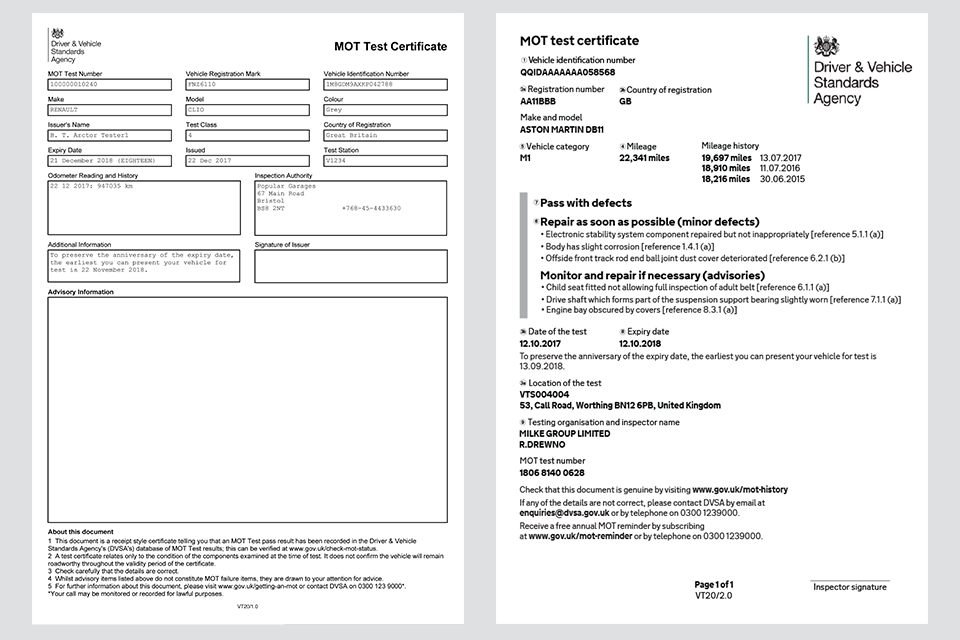News story: MOT rule changes: 20 May 2018
Updated: Added Welsh translation.
The way that the MOT test works in England, Scotland and Wales will change from Sunday 20 May 2018.
The MOT test works differently in Northern Ireland.
The changes will affect cars, vans, motorcycles and other light passenger vehicles.
There are 5 main changes you need to know.
1. Defects will be categorised differently
Defects found during the MOT will be categorised as either:
- dangerous
- major
- minor
The category the MOT tester gives each item will depend on the type of problem and how serious it is.
MOT testers will still give advice about items you need to monitor. These are known as ‘advisories’.
What the new categories mean
| Item result | What it means about the item | How it affects your MOT result |
|---|---|---|
| Dangerous | A direct and immediate risk to road safety or has a serious impact on the environment.
Do not drive the vehicle until it’s been repaired. |
Fail |
| Major | It may affect the vehicle’s safety, put other road users at risk or have an impact on the environment.
Repair it immediately. |
Fail |
| Minor | No significant effect on the safety of the vehicle or impact on the environment.
Repair as soon as possible. |
Pass |
| Advisory | It could become more serious in the future.
Monitor and repair it if necessary. |
Pass |
| Pass | It meets the minimum legal standard.
Make sure it continues to meet the standard. |
Pass |
2. Stricter rules for diesel car emissions

There will be stricter limits for emissions from diesel cars with a diesel particulate filter (DPF).
A DPF captures and stores exhaust soot to reduce emissions from diesel cars.
Check your car’s handbook if you don’t know if your car has a DPF.
Your vehicle will get a major fault if the MOT tester:
- can see smoke of any colour coming from the exhaust
- finds evidence that the DPF has been tampered with
3. Some new things will be included in the MOT

Some new items will be tested during the MOT.
They include checking:
- if tyres are obviously underinflated
- if the brake fluid has been contaminated
- for fluid leaks posing an environmental risk
- brake pad warning lights and if brake pads or discs are missing
- reversing lights on vehicles first used from 1 September 2009
- headlight washers on vehicles first used from 1 September 2009 (if they have them)
- daytime running lights on vehicles first used from 1 March 2018 (most of these vehicles will have their first MOT in 2021 when they’re 3 years old)
There will be other smaller changes to how some items are checked. Your MOT centre will be able to tell you about these.
4. The MOT certificate will change

The design of the MOT certificate will change.
It will list any defects under the new categories, so they’re clear and easy to understand.
The service to check the MOT history of a vehicle will be updated to reflect the changes.
5. Some vehicles over 40 years old won’t need an MOT

Cars, vans, motorcycles and other light passenger vehicles won’t need to have an MOT if they’re over 40 years old and have not been substantially changed (PDF, 62.8KB).
At the moment, only vehicles first built before 1960 are exempt from needing an MOT.
When the rules change on 20 May 2018, vehicles won’t need an MOT from the 40th anniversary of when they were registered. You can check the date the vehicle was registered online.
Example
If a car was first registered on 31 May 1978, it won’t need an MOT from 31 May 2018.
You won’t have to apply to stop getting an MOT for your vehicle.
However, each time you tax your historic vehicle (even if you don’t pay a fee), you’ll have to declare it meets the rules for not needing an MOT.
More information
The maximum fees MOT centres can charge won’t change.
In January 2018, the government decided to keep the age a vehicle needs its first MOT at 3 years, rather than extend it to 4 years.
You can get a free MOT reminder by text message or email a month before your MOT is due.
You can be fined up to £1,000 for driving a vehicle without a valid MOT.

